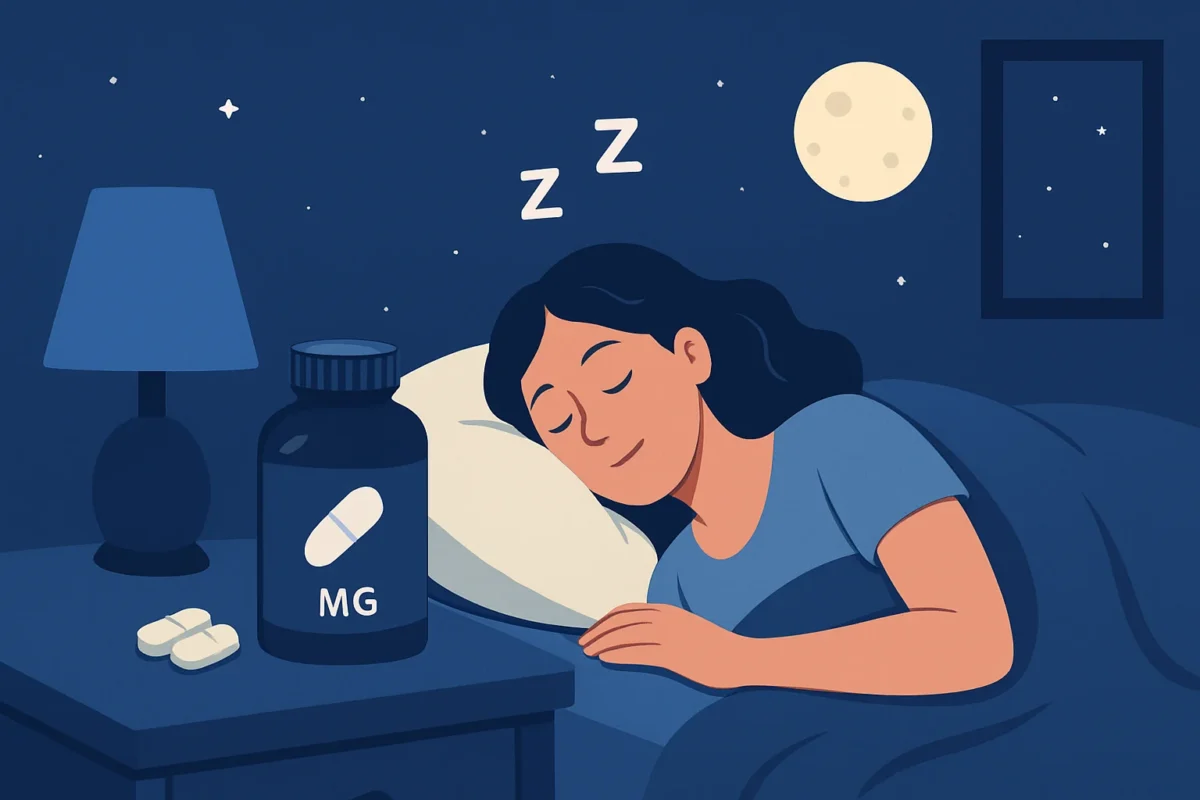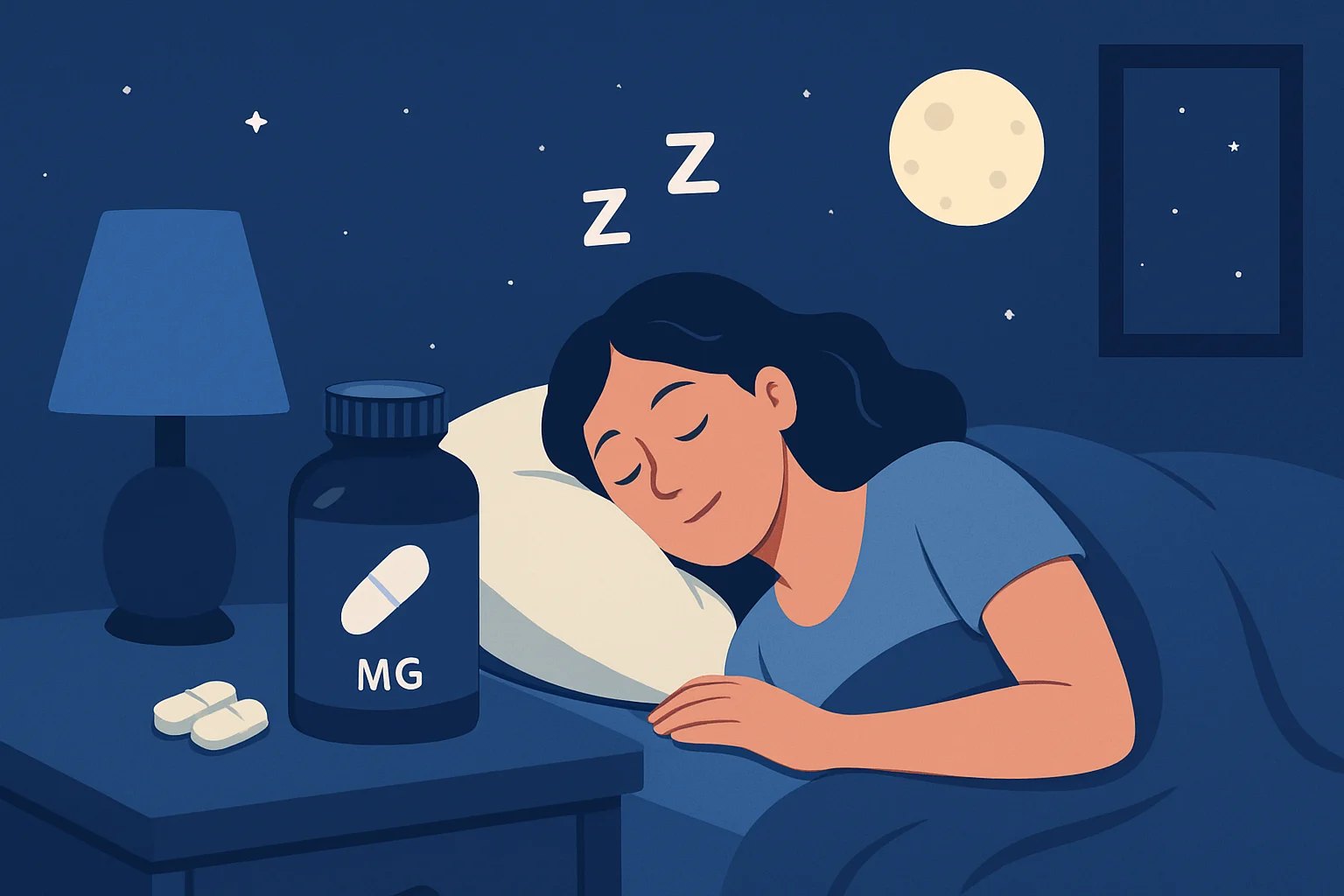Sleep is one of the most important parts of staying healthy, but millions of people have trouble getting the sleep they need. Many people use over-the-counter or prescription drugs, but natural alternatives are getting more attention because they work well and have fewer side effects. Magnesium for sleep is one of the most studied and trusted natural options. This mineral is very important for the body to work properly, especially when it comes to relaxing and resting.
Why Sleep Is More Important Than Ever
A long list of serious health problems, including obesity, depression, weakened immunity, heart disease, and even cognitive decline, are linked to not getting enough sleep on a regular basis. In a world where everything is connected, it’s harder than ever to get good sleep, and it’s more important than ever. Sleep hygiene tips, like cutting down on screen time and sticking to a schedule, are important, but they don’t always work. That’s where help with nutrition comes in.
What Is Magnesium?
Magnesium is a macro-mineral that helps with more than 300 chemical reactions in the body. It helps muscles and nerves work, keeps blood pressure in check, keeps bones healthy, and makes energy. Magnesium is also very important for helping people sleep well and deeply.
Many people don’t get enough magnesium, even though it’s important. This is especially true for people who are under a lot of stress, don’t eat well, or have health problems.
The Science Behind Magnesium and Better Sleep

Over the past 20 years, a lot of research has shown that magnesium can help you sleep better. Here’s what science says about its benefits:
1. Magnesium Helps Keep Melatonin Levels Stable
Magnesium is needed for melatonin, the hormone that controls our sleep-wake cycle, to work properly. Magnesium helps the body make melatonin on its own, which helps the body’s circadian rhythms match up with light cues from the outside world.
2. It Soothes the Nervous System
Magnesium turns on the parasympathetic nervous system, which is in charge of relaxing and resting. It binds to GABA receptors (gamma-aminobutyric acid), which helps you relax and lowers your brain’s excitability, which is important before you go to sleep.
3. It Lowers Levels of Cortisol
High cortisol levels, which is the hormone that causes stress, can make it hard to sleep or keep you awake all night. Magnesium has been shown to lower cortisol levels naturally, which can help you relax at the end of the day.
4. Helps You Sleep Deeply and Restore Your Body
Clinical studies demonstrate that magnesium supplementation enhances sleep quality, extends duration in deep sleep stages, and diminishes instances of early morning awakenings.
- A 2012 double-blind randomized clinical trial published in the Journal of Research in Medical Sciences found that older people who took magnesium supplements slept better, longer, and had fewer sleep problems.
- A 2021 review in Nutrients found that taking magnesium supplements can help people who have trouble sleeping or insomnia.
Who Could Have a Magnesium Deficiency?

Even a small lack of something can make it hard to sleep. If you do the following, you are more likely to have low magnesium levels:
- Eat a diet that is low in nutrients or highly processed
- Drink too much alcohol or coffee
- Feel a lot of stress
- Take some medicines, like diuretics, PPIs, and antibiotics
- Have problems with your stomach and intestines (like IBS or Crohn’s)
- Are more than 60 years old
Blood serum tests can show how much magnesium is in the body, but many people don’t know they are low in magnesium because it is mostly stored in bones and soft tissues.
The Best Types of Magnesium for Sleep

Not all supplements that contain magnesium are the same. Some forms are easier for the body to use and work better to help you sleep:
1. Magnesium Glycinate
A chelated form that is linked to glycine, an amino acid that helps you relax and sleep better. Known for being easy on the stomach and easy to absorb.
2. Magnesium Citrate
Often used to help with digestion, but it can also help with sleep because it absorbs well. Some people may have loose stools as a result.
3. Magnesium L-Threonate
It can cross the blood-brain barrier, which makes it a great choice for cognitive and sleep benefits. Still pretty new, but it looks good.
4. Magnesium Malate
It gives you more energy, but it might still help your muscles relax. Better to use during the day if you’re also tired.
Magnesium Chloride (Topical Magnesium)
When applied directly to the skin with oils or bath flakes, it is a calming way to boost magnesium levels without causing GI problems.
Magnesium-Rich Foods for Better Sleep

Foods that are high in magnesium are one of the best long-term ways to naturally improve your sleep. Here are some of the best choices:
- Spinach, kale, and chard are leafy greens
- Seeds from pumpkins and sunflowers
- Cashews and almonds
- Avocados
- Beans and lentils (black beans, lentils)
- Bananas
- Chocolate that’s dark
- Quinoa, oats, and brown rice are all whole grains
A healthy diet full of whole foods that haven’t been processed is the best way to keep your magnesium levels stable, which will help you sleep better.
How to Use Magnesium to Help You Sleep
Dosage Suggestions
General rules say that needs differ based on age, sex, and health status, but they do say:
- 400–420 mg/day for men
- 310 to 320 mg per day for women
Many experts say that taking 200–400 mg of magnesium glycinate or citrate 30–60 minutes before bed can help you sleep better.
It’s very important to talk to a doctor before starting any supplements, especially if you’re taking medicine or have a health problem.
Timing and Regularity
- The best time is at night: Taking magnesium before bed is the best way to help you relax.
- Stay consistent: It may take some time for effects to show. Use it every day for at least 2 to 4 weeks.
- Add it to your routine: Magnesium works even better when you practice good sleep hygiene, like turning off the lights, cutting back on screen time, and relaxing with a warm bath or meditation.
Stories of Success in the Real World
Sarah, 42—How to Stop Waking Up in the Middle of the Night
“I used to wake up every night at 3 a.m. with my mind racing. I fall asleep faster and stay asleep since I started taking magnesium glycinate. I’ve told everyone I know about it.”
James, 57—Having Trouble with Stress and Sleep
“Work stress kept me from sleeping. I tried everything. In just a few days, magnesium made a big difference. I feel calmer in my mind and body.”
More Ways Magnesium Can Help You Sleep
- Helps with muscle cramps that can keep you from sleeping, especially in older people
- Helps with restless leg syndrome (RLS), which is a known sleep disruptor
- Helps with anxiety, which is often linked to not being able to sleep
- Keeps blood sugar levels in check, which helps keep energy levels steady and stops crashes at night
Things That Aren’t True
“You can get all the magnesium you need from food.”
Diet is the best source, but modern farming has depleted the soil, which means that fruits and vegetables have less magnesium. Many people still don’t make it, even with stressors in their daily lives.
“All magnesium supplements are the same.”
This is a big mistake. Some types don’t get absorbed well or cause problems with digestion. Choosing the right kind is very important for success.
“You only need magnesium if you’re low on it.”
People who are in the “normal” range may still benefit from taking magnesium, especially if they are stressed, can’t sleep, or have tense muscles.
Long-Term Ways to Get Sleep with Magnesium

Magnesium isn’t a quick fix; it works best as part of a long-term, whole-body plan. Here’s how to make it a part of your daily life:
- Make sure you always get enough sleep
Take magnesium with your regular sleep and wake times. Rhythm is good for your body. - Cut down on blue light at night
Magnesium can help you relax, but light from screens can stop melatonin from working. Put your phone in night mode or wear blue light glasses. - Deal with stress during the day
Stress that lasts a long time can lower magnesium levels. Add mindfulness, breathing exercises, and working out to help keep levels healthy. - Drink enough water
Magnesium works best when it is hydrated. Stay away from too much alcohol or caffeine, which can dry you out and take away minerals. - Keep track of how you’re doing
Keep track of changes in your sleep quality and energy levels with a sleep tracker or journal. Change the amount or type of magnesium as needed.
When to See a Doctor
Magnesium is usually safe, but you should talk to your doctor if:
- You have kidney problems, which can change how your body processes magnesium
- You take medications that can interact with magnesium, such as diuretics or antibiotics
- You have side effects like diarrhea or feeling sick
- Sleep problems don’t go away even after taking supplements regularly
Last Thoughts
Magnesium for sleep is more than a natural remedy; it’s a scientifically proven way to bring back one of the body’s most important functions. Magnesium can help you sleep better, deal with insomnia, or deal with chronic stress. It works with your body to help you get deeper, more restorative sleep over time, unlike short-term sleep aids.
Magnesium can be a reliable part of your sleep wellness plan if you take it in the right form, use it regularly, and live a healthy lifestyle. It’s not about quick fixes; it’s about taking care of your body so it can do what it was made to do: rest, heal, and restore.
Don’t Miss:









